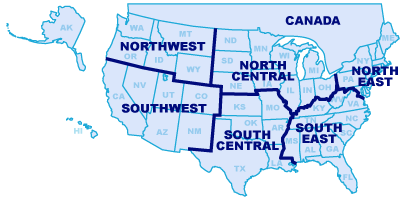Christian Colleges with Recreational Therapy Program
The Christian colleges included here offer your major of interest. You may read through the articles to learn more about your major of interest. You may also select the schools you'd like information from and click "Continue" under the list of schools. The Christian Connector and those schools that you request information from will receive the information you provide on the form so they can respond and meet your information request. Once the form is completed, you'll automatically be entered to win one of four $500 Visa Gift Cards.
Click on the map below to bring schools in the selected region to the top of the list:









Articles on Recreational Therapy:
Major in Recreational Therapy at Christian Colleges
Article by Rachelle Wiggins
“Whatever work God has allotted to you for this day, year, or decade, do it for His glory with the zeal and diligence that is granted to us through the Holy Spirit.” ~Christos Makridis
Recreational therapy (RT) is a health and wellness profession that focuses on helping individuals with illness, disability or trauma develop skills, move through grief, gain confidence and achieve an independent and satisfying life of wellbeing. RT clients range widely from special needs individuals to senior citizens to mental health victims to rehab patients to disabled vets to children with cancer to individuals in addictions recovery to those suffering with chronic disease. Recreational therapists are concerned with interventions and techniques which improve every level of a client’s well-being: emotional, physical, cognitive and psychosocial. Often working as teammates with physical therapists, occupational therapists and physicians, recreational therapists plan, direct and coordinate individualized and group plans to develop life and social skills and optimize community involvement. They often teach stress management techniques and focus on coping skills related to the anxiety and depression that often accompanies illness, injury or disability. The modalities utilized are as diverse as the imagination and include art, games, dance, crafts, gardening, therapy animals, movement, outdoor recreation, sports and aquatics.
So, beyond a compassionate heart that desires to help people, what are some of the other essential skills and traits for excelling as a recreational therapy major? For starters, when working with diverse populations, strong interpersonal and communication skills are a must! In recreational therapy it is imperative to listen well so as to understand the needs of clients and respond with optimum care. There is a lot of explaining, coaching, motivating and evaluation that goes on and a client’s progress must constantly be reassessed. Because of this, it is important to be flexible to the needs of a given situation and to be a creative problem solver. Managing the ever-changing work load and treatment goals of multiple patients requires diligent organizational skills as well.
In order to become a nationally certified recreational therapist you will eventually become a CTRS (Certificated Therapeutic Recreational Specialist). This certification must be maintained and renewed every five years. A major in recreational therapy will see to it that you are adequately prepared and trained to achieve this goal. Most programs will require you to complete a given number of volunteer hours in an approved area of recreational therapy. In addition, you will likely complete an internship before graduation. In addition to this hands-on training, you will complete general education requirements as well as recreational therapy classes in specific areas such as special needs, geriatrics and mental disorders. Other classes you might expect to take include:
- Medical Terminology
- Human Anatomy
- Recreational Program Design
- Human Development
- Client Assessment
- Therapeutic Recreation Administration
- And plenty of psychology (Abnormal, Developmental, etc.)
While almost 40% of RTs work in hospitals others can be found working in residential centers, nursing homes, mental health centers, adult daycare programs, substance abuse centers, hospice care, community centers, and military and school settings. A growing trend is recreational therapy as a private practice where therapy is often conducted from in-home settings. Obviously the most natural fit for a degree as specialized as recreational therapy is in the immediate field of RT. However, RT majors find themselves in other related careers as well. Some examples are:
- Athletic trainer
- Occupational therapist
- Rehabilitation consultant
- Life coach
- Special education teacher
- School counselor
If you empathize with the hurting and thrive in a caregiving role, then maybe God’s next step for you is a major in recreational therapy! “Commit your work to the Lord, and your plans will be established.” Proverbs 16:3
A future in Recreational Therapy
By Jennifer Bailey
There’s something deeply healing and beautiful about the arts. Right along with that, not a lot beats the rush of endorphins after a run, or the warm, comfortable feeling that comes after you commune with a group of friends. Whether it’s going for an early morning swim at the local community pool, watching the velvet curtains close on a magnificent theatrical performance, listening to a majestic symphony, or having a deep conversation with another person, the worlds of art, endorphins, and people does something glorious for the soul. But what do these three fields have in common?
The arts, exercise and community outings are all vehicles that recreational therapists use to help others. Recreational therapy is a great gift to many people, and without recreational therapists, many people would simply fail to heal or develop as quickly as they may have otherwise. Recreational therapists coordinate, plan, and direct recreation-based activities and programs for people who have disabilities or are recovering from an illness or injury. Using a variety of modalities, such as art, exercise, music, dance, sports, community outings, and aquatics, these therapists help maintain and improve a patient’s social, emotional, and physical well-being.
Whether it’s teaching patients how to cope with anxiety or depression, implementing plans to prevent a patient from harming him or herself, or helping a patient learn social skills, recreational therapists play a big role in helping those with long-term disabilities or illnesses. They may also assist patients via observations, medical tests, discussions with the patient’s family, and through specific treatment plans. By evaluating the patient’s progress over time, a recreational therapist can evaluate which interventions are most effective.
The majority of recreational therapists are employed by hospitals or nursing care facilities, but many are also employed by the government or through retirement communities. They may work with surgeons, nurses, psychologists, social workers, physical therapists, or occupational therapists as they assess a patient’s progress. Depending on the patient, therapists may also end up traveling with the patient and his or her family to continue care on the go.
Most recreational therapists generally need a bachelor’s degree in recreational therapy or a related field. Courses usually include studies on human anatomy, assessment, psychiatric terminology, disabilities, and the use of assistive devices. Certification is also an important part of education for therapists and most hospitals prefer to hire certified recreational therapists. The National Council for Therapeutic Recreation Certification (NCTRC) offers the Certified Therapeutic Recreation Specialist (CTRS) credential, which requires a bachelor’s degree, an internship of 560 hours, and passing an exam. Other pathways to getting certified include a bachelors in an unrelated field combined with additional classes and work experience, as well as passing the exam.
It’s important for recreational therapists to have some key skills: compassion is a must as is kindness and empathy when working with patients, and their relatives can really make a big difference in how cared for a family feels. Other important skills to have are leadership tendencies, good listening skills, patience, resourcefulness, and great communication skills.
If you’ve always dreamed about your life’s work centering around caring for others, but the educational requirements for nursing or becoming a doctor have always been a bit overwhelming, consider recreational therapy. You really get the best of both worlds, and you’ll be able to make a difference in someone’s life by using tools that all humans need in their life in one way or another.